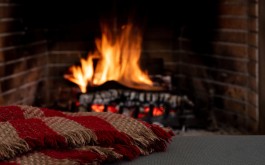Annonce Importante : Regroupement des cabinets Harmonia Assurance, DPJL et La Turquoise. Pour plus d'informations, consulter notre communiqué de presse.
Here are some tips on how to use your heating systems safely, whether they are wood, electric, oil, or gas, to avoid finding yourself... in a heated situation!
General tips on heating your home safely and efficiently
Whatever your home heating system, regular maintenance is the best way to save yourself a lot of problems!
- Have a certified technician inspect your furnace, boiler or fireplace every year. This will ensure that all parts are in good shape.
- In the fall, clean or replace your furnace's filter, and remove dust from your baseboards.
- Clear inlets and outlets to ensure proper circulation of air and gas. Give your appliance enough space for proper ventilation.
- If necessary, clear snow from the appliance’s outdoor components.
Try to be as energy-efficient as possible!
According to the Government of Canada, heating accounts for around two-thirds (63.6%) of the energy consumed in the average Canadian home. In addition to regular system maintenance, here are three simple ways to reduce your energy consumption:
- Improve your home’s insulation by detecting and eliminating air leaks. Install weather-stripping and caulk drafty windows and doors.
- Set your thermostat carefully during the winter months: a drop of just 1°C can generate savings of 5–7% on your annual heating bill.
- Invest in energy-efficient equipment when replacing your heating system. Check this webpage for tips on how to choose the most energy-efficient models.
Tips for the various types of heating systems
1. Heating with wood
Do you enjoy the sight and smell of a roaring fire? Be careful because poorly installed wood-burning appliances (stoves and fireplaces) are the cause of many fires every year.
Is your word-burning appliance legal or not?
Before buying a new wood-burning appliance, make sure it bears a seal from the CSA Group or the U.S. Environmental Protection Agency (Energy Star). Appliances certified by these organizations emit fewer toxic particles and consume up to 20% less fuel than conventional models.
Also, check the standards in effect in your city or province. For example, the City of Montreal has had a wood-burning appliance bylaw since 2015.
Heating your home safely and efficiently with wood
- Have your chimney swept by a professional chimney sweep every year to remove the highly flammable creosote (a smoke residue) that builds up on chimney walls.
- Let enough air into the chimney to support a roaring fire. This promotes complete combustion and reduces smoke.
- Firewood and other combustible materials must be stored at least 1.5 m from the heating appliance.
- Store cords of wood outdoors away from the house, and protect the wood against the elements. Damp wood burns poorly and produces more creosote.
- Only burn wood and paper in your fireplace or stove. Any other substance may produce toxic fumes.
- Place ashes in a metal container with a raised bottom and store outdoors away from combustible materials for at least 72 hours.
2. Heating your home safely and efficiently with electricity
Although electric heating is the most common type of heating in Quebec, it must be managed responsibly.
Best electric heating practices
- Use electrical appliances bearing the seal of an accredited approval body.
- Don't place anything on electric baseboards (such as mittens or socks to dry) since objects in direct contact with this heat source may melt or even catch fire.
- For the same reason, keep furniture and curtains at least 10 cm away from baseboards. It also makes sense to install rods on baseboards to push back curtains and prevent overheating. These rods can be purchased from hardware or home improvement stores.
If you need to repaint a baseboard, be sure to use only high-heat-resistant paint (spray or liquid).
3. Using space heaters safely and efficiently
- Plug the heater directly into an electrical outlet. Avoid using an extension cord.
- Keep the heater out of reach of children and pets.
- Do not leave portable heaters unattended when in operation.
4. Using oil- or gas-fired heaters safely and efficiently
If you have a gas-fired furnace, boiler or fireplace, here are the main things to watch out for:
- Check that the gas fireplace’s glass doors are sealed tight before using it.
- Don't forget to turn off the fireplace when you leave the house or go to bed.
Try to be as environmentally friendly as possible!
Heating with gas or oil emits greenhouse gases that contribute to climate change. If possible, opt for a greener heating solution. If not, here are a few tips for reducing the amount of fuel needed to heat your home and thereby limit your greenhouse gas emissions:
- Insulate your ducts to prevent heat loss.
- Replace your aging gas or oil furnace with a newer, more efficient model.
- Install smart thermostats to control temperature more precisely and avoid overheating seldom-used rooms.
Don't forget!
When the clocks change in the spring or the fall is an ideal time to check and replace batteries in smoke alarms and carbon monoxide detectors.
- The hallways and bedrooms on each floor of your house or apartment, including the basement, must be equipped with at least one smoke alarm.
- A carbon monoxide alarm should be installed in any room where a gas or oil furnace is located.
- Keep a portable extinguisher in an accessible place and, above all, make sure you know how to use it!
Remember: prevention is the best protection against heating-related accidents. That’s why a well-maintained heating system is essential for a safe and cozy winter.
For a more worry-free winter, be sure to contact your broker to find the home insurance that’s best for you!
